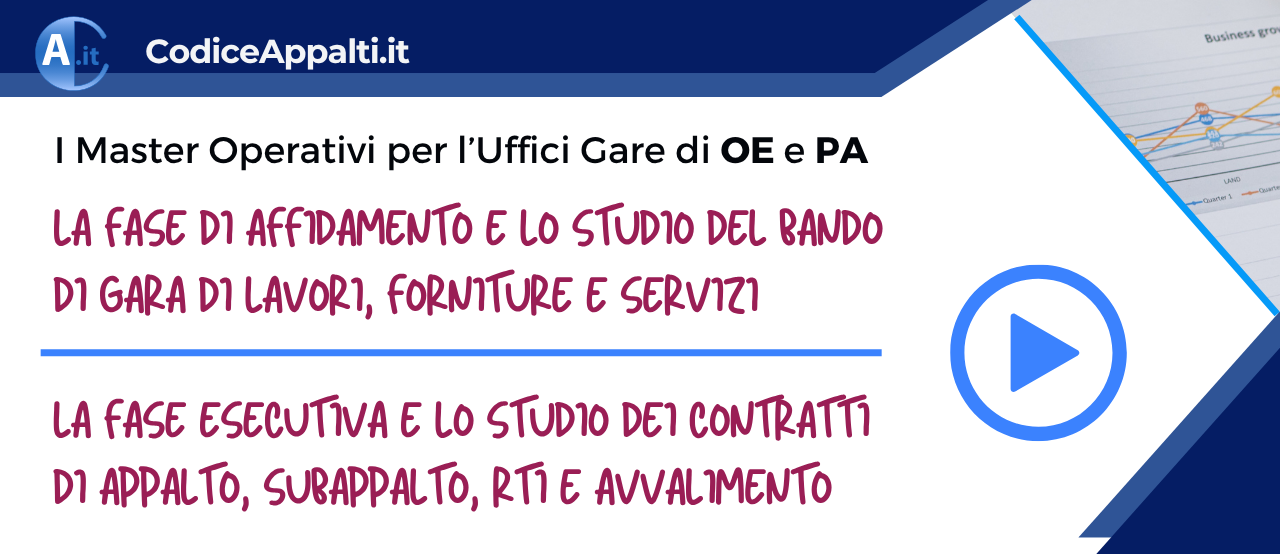Article 68. Temporary groupings and ordinary consortia of economic operators.
1. The submission of offers by the entities referred to in article 65, paragraph 2, letter e) and letter f), is permitted, even if not yet established. In this case the offer must be signed by all the economic operators who will constitute the temporary groupings or ordinary consortia of competitors and must contain the commitment that, in the event of the tender being awarded, the same operators will confer a special collective mandate with representation to one of them, to be indicated in the offer and qualified as agent, who will stipulate the contract in the name and on behalf of himself and the principals. 2. Without prejudice to the provisions of paragraph 4, the categories of work are specified in the offer or the parts of the service or supply that will be carried out by individual economic operators united or associated with a consortium, with their commitment to carry them out. 3. Temporary groupings cannot be obliged to have a specific legal form for the purposes of presenting a the offer or a request for participation. 4. The contracting authorities may: a) require groupings of economic operators to assume a specific legal form after the award of the contract, in the event that such transformation is necessary for the good execution of the contract; b) specify in the tender documents the methods with which the groups of economic operators comply with the requirements regarding economic and financial capacity or technical and professional capabilities, provided that this is proportionate and justified by objective reasons. 5 To establish the temporary grouping, the economic operators must confer, with a single deed, a special collective mandate with representation to one of them, called the agent. 6. The mandate must result from an authenticated private agreement. The relevant power of attorney is granted to the legal representative of the mandated economic operator. The mandate is free and irrevocable and its revocation, even for just cause, has no effect on the contracting authority. In the event of non-compliance by the agent company, the revocation of the special collective mandate referred to in paragraph 5 is permitted in order to allow the contracting authority to make direct payments to the other companies in the group. 7. The agent has exclusive representation, including procedural, of the principals towards the contracting authority for all operations and acts of any nature dependent on the contract, even after testing, or equivalent act, until the termination of any relationship. The contracting authority, however, can directly enforce the responsibilities of the principals. 8. The mandate relationship does not in itself determine organization or association of the combined economic operators, each of whom retains their autonomy for the purposes of management, tax and social security obligations. 9. The offer of the grouped economic operators or consortium members determines their joint and several liability towards the contracting authority, as well as towards the subcontractor and suppliers. In the case referred to in paragraph 4, letter a), the joint and several liability referred to in the first sentence coincides with that of the legal entity into which the temporary grouping or ordinary consortium has transformed. In the case referred to in paragraph 4, letter a) and in the event that the joint or consortium competitors indicated by the consortium as executors, even in part, of the works after the award constitute among themselves a company, including a consortium, pursuant to the Book V of Title V, Chapters III and following of the civil code, for the unitary, total or partial execution of the works, the joint and several liability referred to in the first sentence concurs with that of the legal entity in which the temporary grouping or ordinary consortium takes place are transformed from the date of notification of the deed of incorporation to the contracting authority and, subordinately, to the registration of the company in the business register. In this case the company takes over, without this constituting any subcontracting or transfer of contract and without the need for authorization or approval, in the total or partial execution of the contract. 10. The contracting authorities may request the groupings of economic operators conditions for the execution of a contract different from those imposed on individual participants, provided that they are proportionate and justified by objective reasons. 11. Ordinary groupings and consortia of economic operators are admitted to the tender if the entrepreneurs or other grouping that participate, or the consortium entrepreneurs, have overall the requirements relating to economic and financial capacity and technical and professional capabilities, without prejudice to the It is necessary for the performer to be in possession of the requirements prescribed for the performance that he has undertaken to carry out pursuant to paragraph 2. The provisions contained in Annex II.12. 12 apply to the extent compatible. If the individual competitor o the competitors who intend to form a temporary group meet the requirements set out in this article, may group other qualified companies also for categories and amounts different from those requested in the notice, provided that the works carried out by the latter do not exceed 20 percent of the the overall amount of the works and that the overall amount of the qualifications possessed by each is at least equal to the amount of the works that will be entrusted to it. 13. All participants in the group and in the ordinary consortium possess the general requirements referred to in the articles 94 and 95. 14. Participation in the tender by competitors in more than one ordinary group or consortium, or individually if they have participated in the same tender in an ordinary group or consortium, determines their exclusion if the conditions of referred to in Article 95, paragraph 1, letter d), provided that the economic operator does not demonstrate that the circumstance did not influence the tender, nor is it likely to affect the ability to comply with the contractual obligations. 15. The association in participation both during the tender procedure and following the award. The modification of consortia and groupings is admissible within the terms indicated in article 97 and paragraph 17 of this article. 16. Failure to comply with the provisions of paragraph 15 entails the exclusion of competitors grouped in an ordinary group or consortium of competitors , as well as the cancellation of the award or the termination of the contract. 17. The withdrawal of one or more grouped companies is permitted, provided that the remaining companies have the qualification requirements appropriate to the works or services or supplies still to be performed. Withdrawal is permitted even if the grouping is reduced to a single entity. 18. The provisions referred to in paragraph 17 also apply with reference to the subjects referred to in article 65, paragraph 2, letters b), c), d ) and f). 19. In the case of restricted or negotiated procedures or competitive dialogue, the individually invited economic operator or the candidate individually admitted to the competitive dialogue procedure may submit an offer or negotiate on his own behalf or as agent of grouped operators. 20 This article applies, insofar as it is compatible, in the participation in the awarding procedures of the aggregations between the companies adhering to the network contract, referred to in article 65, paragraph 2, letter g); the latter, in the event that they have all the requirements of the stable consortium referred to in article 65, paragraph 2, letter d), are equated with it for the purposes of SOA qualification. EFFECTIVE FROM: 1 July 2023Relazione
REPORT
Article 68 regulates the new configuration of the temporary grouping institution, which allows the submission of an offer on the basis of the collective mandate alone, without requiring furthe...
Commento
NEW
• The commitment on the part of each member to carry out the part within their competence (paragraph 2) has been envisaged.
• The distinction between "vertical" and "horizontal" RTI and the dist...
Condividi questo contenuto:






